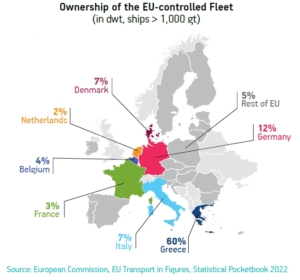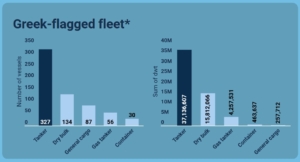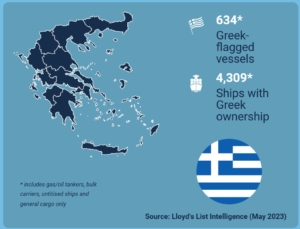The Greek Shipping Cluster is going full ahead





 By Marek Grzybowski
By Marek Grzybowski
The Greek Sea Cluster is going full ahead. Its foundation is shipowners. The Greeks bet on modern ships with an ever-increasing carrying capacity. They chose the market for bulk carriers and tankers, which turned out to be a bull’s-eye.
By entering markets with high profitability, tonnage investments and dominance in selected sectors are possible. Greek financial institutions support Greek shipowners in their investment processes.
– The increased prominence of homegrown Greek financial institutions in financing Greek shipping has been built on years of commitment to the industry and the relationship now extends to sustainability-linked loans – Nigel Lowry, Lloyd’s List Athens Correspondent writes.
– Over the past ten years, the total capacity of the Greek merchant fleet, which currently consists of 5,520 vessels, has increased by 50%. This cemented Greece’s position as the largest shipping country in the world. Collectively, Greek shipowners control the largest part of the world’s merchant fleet – 21% in terms of deadweight, according to the Union of Greek Shipowners (UGS) in the introduction to the annual report.
Hellas shipowners dominate
Hellas shipowners dominated the shipping market based on tankers and bulk carriers. According to UGS data, Greek shipping accounts for 31% of the world’s tanker fleet, 25% of the bulk carrier fleet, 22% of LNG carriers, 15% of chemical tankers and 11% of LPG tankers. Greek shipowners manage 8% of the world’s container fleet.
– Global trade and supply chains rely primarily on a well-functioning maritime transport sector. In an era characterized by volatility and unforeseen events, such as the recent COVID-19 pandemic and geopolitical conflicts, it is crucial to ensure a stable regulatory framework and a level playing field for shipping around the world.
Strategy – full speed ahead
The development of the Greek fleet has not slowed down despite the turmoil caused by the pandemic, the disruption of supply chains, the war in the Black Sea and the economic slowdown in many markets. Melina Travlos, President of the Union of Greek Shipowners, referred to this in the introduction to the report.
“In this ever-changing environment, Greek shipping, with its long-standing know-how and collective dynamism, continues to successfully rise to the current challenges, maintaining our leading role, both in quality tonnage and market share, thus continuing to offer reliable, high quality services to the international market”- emphasizes Melina Travlos, President of the Union of Greek Shipowners, emphasizing the role of shipping in maintaining economic cooperation within the global village.
Greek shipping in the European economy
Greek shipping also plays a very important role in the European economy. Greek tonnage accounts for 60% of the fleet controlled by operators from EU countries.
For comparison, shipowners from Germany own 12% of the fleet. Poland about 1%. Greek shipowners manage the fleet of 80% of EU bulk carriers, 73% of tankers, 85% of LNG carriers and 17% of container ships managed by EU operators.
Sailors – heroes of the times of Covid
The report draws attention to the important role of ship crews and people involved in maritime transport and ship servicing. It states that the COVID-19 pandemic has clearly highlighted the importance of the human factor in shipping.
During this period, seafarers made a huge contribution to the uninterrupted operation of world maritime trade.
“The difficulty of attracting and training enough young officers to keep up with their massive fleet is another priority for Greek owners as they try to maintain a leading role,” writes Nigel Lowry in his own report on the Greek fleet.
Therefore, it is considered essential to recognize the role of seafarers in ensuring the supply and stability of the transport chain on the part of the international community. It is underlined that the role of seafarers as key workers and unsung heroes during the very unfavorable conditions of global maritime trade must be recognized through concrete measures.
The Greek fleet plays an important role in the country’s economy. The Bank of Greece calculated that gross receipts from maritime transport services in 2015-2021 exceeded on average 13 billion euros per year, which is about 7% of GDP. And this was at a time when the Greek fleet was about 20% to 40% smaller than it is today.
